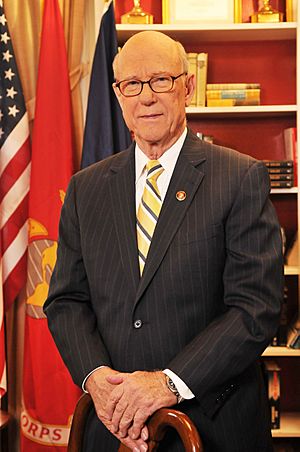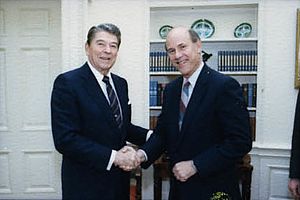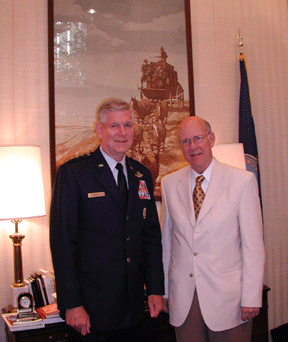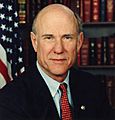Pat Roberts facts for kids
Quick facts for kids
Pat Roberts
|
|||||||||||||||||||||||||||||||||||||||||||||
|---|---|---|---|---|---|---|---|---|---|---|---|---|---|---|---|---|---|---|---|---|---|---|---|---|---|---|---|---|---|---|---|---|---|---|---|---|---|---|---|---|---|---|---|---|---|

Roberts in 2015
|
|||||||||||||||||||||||||||||||||||||||||||||
| United States Senator from Kansas |
|||||||||||||||||||||||||||||||||||||||||||||
| In office January 3, 1997 – January 3, 2021 |
|||||||||||||||||||||||||||||||||||||||||||||
| Preceded by | Nancy Kassebaum | ||||||||||||||||||||||||||||||||||||||||||||
| Succeeded by | Roger Marshall | ||||||||||||||||||||||||||||||||||||||||||||
|
|||||||||||||||||||||||||||||||||||||||||||||
| Member of the U.S. House of Representatives from Kansas's 1st district |
|||||||||||||||||||||||||||||||||||||||||||||
| In office January 3, 1981 – January 3, 1997 |
|||||||||||||||||||||||||||||||||||||||||||||
| Preceded by | Keith Sebelius | ||||||||||||||||||||||||||||||||||||||||||||
| Succeeded by | Jerry Moran | ||||||||||||||||||||||||||||||||||||||||||||
| Personal details | |||||||||||||||||||||||||||||||||||||||||||||
| Born |
Charles Patrick Roberts
April 20, 1936 Topeka, Kansas, U.S. |
||||||||||||||||||||||||||||||||||||||||||||
| Political party | Republican | ||||||||||||||||||||||||||||||||||||||||||||
| Spouse |
Franki Fann
(m. 1969) |
||||||||||||||||||||||||||||||||||||||||||||
| Children | 3 | ||||||||||||||||||||||||||||||||||||||||||||
| Education | Kansas State University (BA) | ||||||||||||||||||||||||||||||||||||||||||||
| Military service | |||||||||||||||||||||||||||||||||||||||||||||
| Allegiance | |||||||||||||||||||||||||||||||||||||||||||||
| Branch/service | |||||||||||||||||||||||||||||||||||||||||||||
| Years of service | 1958–1962 | ||||||||||||||||||||||||||||||||||||||||||||
| Rank | |||||||||||||||||||||||||||||||||||||||||||||
Charles Patrick "Pat" Roberts (born April 20, 1936) is a retired American politician. He served as a U.S. Senator for the state of Kansas from 1997 to 2021. Before becoming a senator, he was a member of the U.S. House of Representatives for 16 years. Roberts is a member of the Republican Party.
Born in Topeka, Kansas, Roberts graduated from Kansas State University. He then served in the U.S. Marine Corps as a First Lieutenant. After his military service, he worked as a newspaper reporter. He began his career in politics in the late 1960s.
Roberts is the first person in history to have been the chairman of both the House and Senate Agriculture Committees. These committees are very important for farming and food in the United States. On January 4, 2019, Roberts announced he would not run for reelection in 2020. He retired from the Senate on January 3, 2021.
Early Life and Education
Pat Roberts was born on April 20, 1936, in Topeka, Kansas. His father, C. Wesley Roberts, was also involved in politics and served as the Chairman of the Republican National Committee. His family had a history in the newspaper business. His great-grandfather founded the Oskaloosa Independent, one of the oldest newspapers in Kansas.
Roberts graduated from Holton High School in 1954. He then attended Kansas State University, where he earned a degree in Journalism in 1958. After college, he joined the U.S. Marine Corps and served as an officer from 1958 to 1962.
After leaving the military, Roberts worked as a reporter and editor for newspapers in Arizona. In 1967, he started working for Kansas Senator Frank Carlson. This was his first step into a long career in government.
Career in Politics
U.S. House of Representatives (1981–1997)

In 1980, Roberts was elected to the United States House of Representatives. He represented the 1st Congressional District of Kansas. The House of Representatives is one of the two parts of the U.S. Congress, where laws are made.
He was re-elected seven times, serving a total of 16 years in the House. During his last two years, from 1995 to 1997, he was the chairman of the House Agriculture Committee. This committee deals with laws related to farming, food, and rural areas.
U.S. Senate (1997–2021)
In 1996, Roberts decided to run for the U.S. Senate when Senator Nancy Kassebaum retired. The Senate is the other part of the U.S. Congress. Each state has two senators. He won the election and began his first term in 1997.
Roberts was re-elected three more times, in 2002, 2008, and 2014. He served a total of 24 years in the Senate. This made him one of the longest-serving politicians from Kansas.
Key Political Roles
During his time in the Senate, Roberts held several important leadership positions.
Intelligence Committee
From 2003 to 2007, Roberts was the chairman of the Senate Intelligence Committee. This committee oversees the nation's intelligence agencies, like the CIA. During this time, he led an investigation into the information that was gathered before the 2003 invasion of Iraq.
Agriculture Committee
From 2015 to 2021, Roberts was the chairman of the Senate Agriculture Committee. This made him the first person to ever lead the agriculture committees in both the House and the Senate. He had a big influence on laws affecting American farmers and the food supply.
Dwight D. Eisenhower Memorial
Roberts also served as the chairman of the commission to build a national memorial for President Dwight D. Eisenhower. After many years of planning, the memorial was dedicated in Washington, D.C., on September 17, 2020.
Political Views
Pat Roberts was known for his conservative political views.
- Healthcare: Roberts was against the Patient Protection and Affordable Care Act, also known as Obamacare. He voted against the law in 2009 and supported efforts to change it.
- GMO Foods: In 2016, Roberts introduced a bill about the labeling of foods with genetically modified organisms (GMOs). The law created a national standard for labeling these foods. It was supported by many food companies but opposed by groups who wanted stricter labeling rules.
- Environment: Roberts supported using natural resources like oil and gas. He voted in favor of projects like the Keystone XL Pipeline. He also signed a letter asking the president to withdraw the U.S. from the Paris Agreement, an international agreement on climate change.
- Gun Laws: Roberts generally supported gun rights and had a high rating from the National Rifle Association (NRA). However, after a school shooting in 2018, he said that he supported raising the age limit for buying certain types of rifles.
Personal Life
Pat Roberts married Franki Fann in 1969. They have three children: David, Ashleigh, and Anne-Wesley.
Images for kids
-
Roberts and Kika de la Garza at a House Agriculture Committee meeting in 1994
See also
 In Spanish: Pat Roberts para niños United States congressional delegations from Kansas
In Spanish: Pat Roberts para niños United States congressional delegations from Kansas




